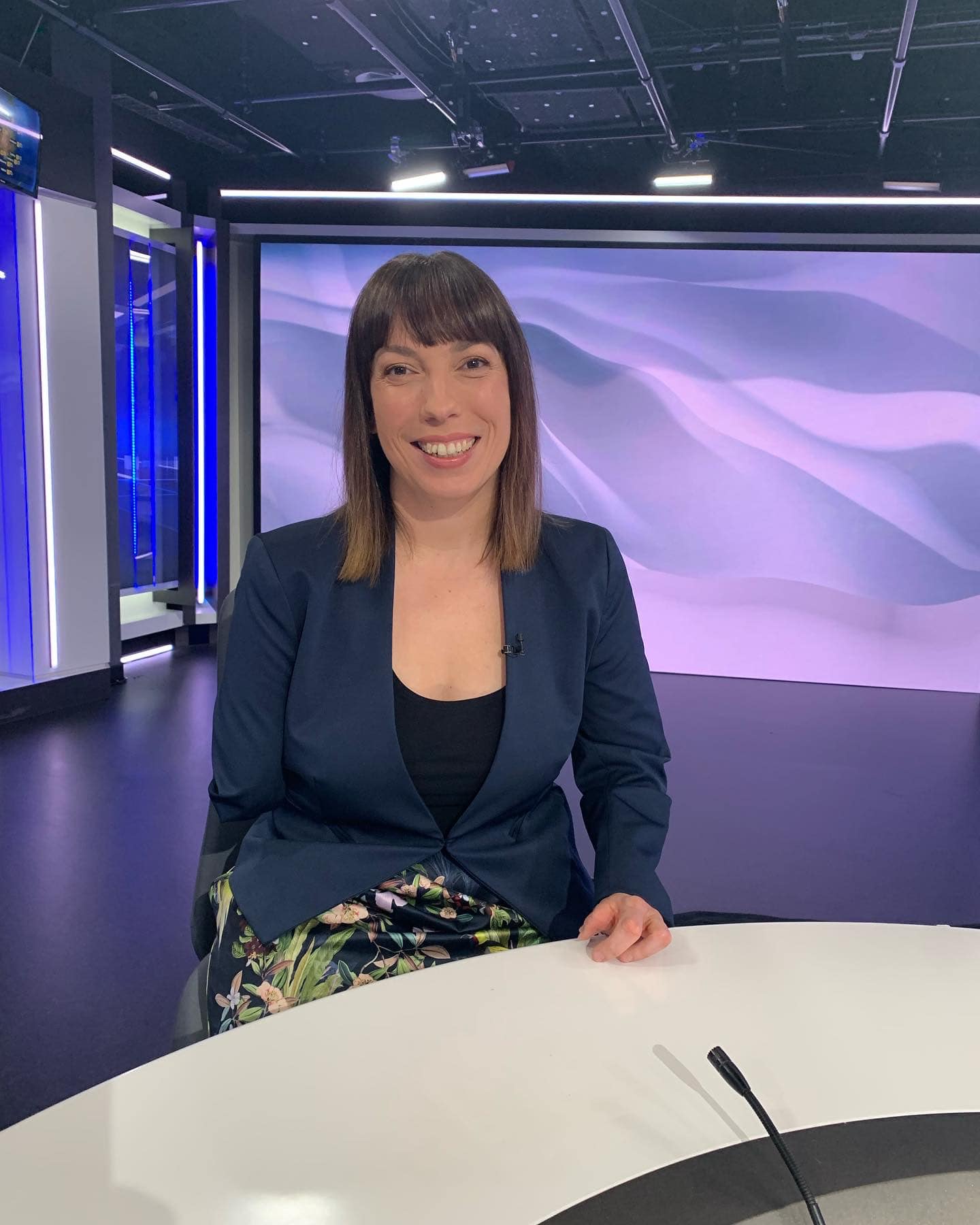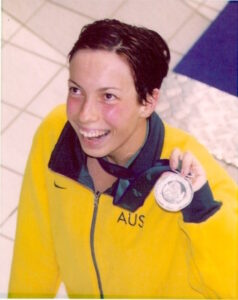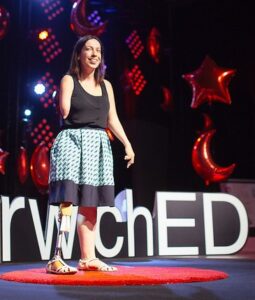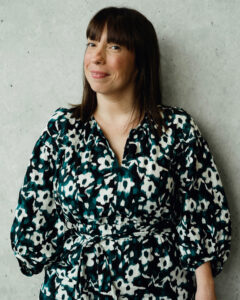
by Fiona Passmore
As an ABC sports reporter, writer and speaker, Liz Wright is passionate about how media portrays disabilities and shares her views about how much this impacts the way we feel and interact.
Liz first learnt about Aussie Hands while competing as a Paralympic swimmer alongside our former Patron, Jessica Smith. She followed Jessica on social media, then several years later wrote a story featuring two of our members, Knox and Ayelet. Now it’s our turn to put the spotlight on Liz as we head towards the Paris 2024 Olympic & Paralympic Games.
Liz’s right arm finishes at the elbow, and she is missing two fingers and the forearm bone on her left hand. She also has a shorter right leg and is currently getting to grips with a new prosthesis. ‘I tried a prosthesis for my arm when I was about six or seven years old, but it lasted about three days before I threw it across the room in frustration,’ she confessed. We can forgive her for that outburst because in the 1980’s prostheses were more cosmetic than functional, and she soon realised she could do more without it.
She has high praise for Nas Campanella who created the ABC’s Disability Affairs Reporter role. This makes the ABC the only non-disability-specific media organisation in Australia to have done this, but she hopes others will follow suit. The disabled community is constantly growing so it’s crucial we have disabled people working in front of and behind the cameras, such as Charles Brice and Sarah Richards as well as Nas.
‘I’m very enthusiastic about journalism and media representing the 4.4 million people in Australia who have a disability, because you can’t be what you can’t see. And I love storytelling which is the best way to change hearts and minds,’ she added.
Creating a sense of belonging is so important when you’re growing up, and the inclusion of disabled characters in the media helps break down barriers for everyone. Fans of the second series of Llama Llama on Netflix will be familiar with Audrey the Antelope who has limb differences. Liz explained: ‘Audrey’s disability is almost identical to mine and when I saw it for the first time, it made me cry. If only I’d watched something like that during my childhood, it would have made me feel so much more comfortable and included during those impressionable years.’
In the Disney movie Luca, the character Massimo has an upper limb difference, but this doesn’t define him and isn’t a focus of the storyline. Unfortunately, the Witches movie didn’t portray disability in a positive light, but something constructive did come out of it when the Lucky Fin Project advised Warner Bros about how to better represent limb difference in future films.
Liz has a love-hate relationship with social media, which I’m sure is a sentiment shared by many of us. ‘It is great for creating a sense of community, connecting limb different people who just get it, understand the difficulties, and help celebrate achievements. Negativity is generated by trolls who leave disturbing comments which are discriminatory, insulting and make fun of you. But I still feel the positives outweigh the negatives,’ said Liz.
 The language used to refer to disabilities is constantly evolving, and Liz is a firm believer in it being your choice on how you express things. In the UK, where she worked for 13 years, ‘identity-first’ language is the preference, which Australia is gradually adopting. For example, referring to a ‘disabled person’ rather than a ‘person with a disability’ or an ‘autistic child’ rather than a ‘child with autism’. However, she admitted to feeling less tolerant of the word ‘handicapped’ which makes her cringe, but this usually comes from older people who grew up hearing this terminology.
The language used to refer to disabilities is constantly evolving, and Liz is a firm believer in it being your choice on how you express things. In the UK, where she worked for 13 years, ‘identity-first’ language is the preference, which Australia is gradually adopting. For example, referring to a ‘disabled person’ rather than a ‘person with a disability’ or an ‘autistic child’ rather than a ‘child with autism’. However, she admitted to feeling less tolerant of the word ‘handicapped’ which makes her cringe, but this usually comes from older people who grew up hearing this terminology.
‘Media representation must show stories of the full spectrum of the community because there are so many disabilities and so many ways to live your life as a disabled person,’ Liz emphasized. ‘We have different interests, dreams, and goals just like anyone else,’ she added. Liz is proud to be disabled and believes that society creates the barriers and burdens, not the individuals themselves.
A recent ABC Four Corners episode investigated classification cheating by Paralympians. But this issue was around during the Sydney 2000 Games when the Spanish intellectual disabilities basketball team was disqualified, after it was discovered that more than half of them didn’t qualify for that category. ‘Some people were shocked at this, perhaps because the non-disabled community tend to frame disability as a tragedy, awful or pitiable or assume the athletes are angels, resilient and innocent so this shouldn’t happen,’ reflected Liz.
Should people with disabilities be labelled as ‘inspiring’? For Liz, this depends on the context. ‘If someone said to me “you won a silver medal, that’s so inspiring,” I would thank them,’ she said. ‘On the other hand, being grabbed by the arm at a supermarket checkout and told I am so inspiring is not welcome. How can doing your weekly shopping be an inspiration?’ Liz chuckled. This can be frustrating, but that shopper perhaps thought she’d paid Liz a compliment and made her day.
Being caught off guard during speaking events is nothing new for Liz and she admitted that holding the attention of young children can be a challenge. She laughed about some of the more unusual questions which have included, ‘what’s your favourite pizza?’ or ‘how do you float in water?’ which had no connection to the message in her presentation.
‘An emotional moment that still resonates with me today, happened after a school presentation for parents who wanted reassurance about the future for their disabled children. The teacher tapped me on the shoulder and asked if I would speak to Emily who was sitting in the corner crying. My heart sank as I desperately tried to recall what I’d said that might have upset this eight-year-old. But her Mum told me ‘’you made Emily realise she can achieve something in life,”’ recalled Liz, who was then also reduced to tears. ‘I believe that insufficient representation in the media and her community made her think she didn’t have many prospects to look forward to. However, I’m happy to report that Emily is now at college in the UK studying to become a fashion designer, with an ambition to design clothes particularly for people with disabilities,’ Liz proudly added.
 Her advice, especially for new parents, is: ‘Life isn’t going to be easy, but it isn’t for anyone, disabled or not. Don’t let a fear of disability stop you or your child. Don’t be scared of providing them with opportunities to thrive, because change won’t happen if we overprotect kids,’ she suggested. Her parents wanted her to grow up with no special treatment or schools, believing that if she was sheltered, she wouldn’t cope as well in the real world. It looks like their philosophy has worked for Liz.
Her advice, especially for new parents, is: ‘Life isn’t going to be easy, but it isn’t for anyone, disabled or not. Don’t let a fear of disability stop you or your child. Don’t be scared of providing them with opportunities to thrive, because change won’t happen if we overprotect kids,’ she suggested. Her parents wanted her to grow up with no special treatment or schools, believing that if she was sheltered, she wouldn’t cope as well in the real world. It looks like their philosophy has worked for Liz.
Many thanks Liz for making time in your hectic calendar to chat with Aussie Hands.



